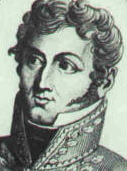Jean Auguste Durosnel
Jean Auguste Durosnel , actually Antoine Jean Auguste Henri Durosnel (born November 9, 1771 in Paris , † February 5, 1849 ibid) was a French Général de division of the cavalry and politician.
Live and act
Durosnel was the son of Jean-Baptiste du Rosnel, an administrative officer in the War Department .
In 1783, at the age of twelve, Durosnel joined the Gendarmerie de France at the request of his family . After an almost military training, he was taken over on November 12, 1786. During the Revolution , Durosnel joined the army and came there on April 22, 1792 with the rank of captain as aide-de-camp to General Louis-Auguste Jouvenel des Ursins d'Harville .
With the intercession of General d'Harville, Durosnel was promoted to Colonel on July 26, 1799. As such he took u. a. participated in battles near Meßkirch (May 5, 1800) and Hohenlinden (December 3, 1800).
In the following coalition wars, Durosnel fought near Amstetten (November 5, 1805), Hollabrunn (November 16, 1805) and Austerlitz (December 2, 1805). On December 24, 1805, Napoleon Bonaparte promoted Durosnel to général de brigade and on April 16, 1809 to général de division.
Durosnel fought near Ebelsberg (May 3, 1809) and was seriously wounded near Aspern (May 21/22, 1809). In the process, he was taken prisoner by Austria and was only released after the end of the fifth coalition war .
When Napoleon planned his invasion of Russia , he brought Durosnel to his staff with the rank of aide-major général . Although entrusted with administrative tasks there, Durosnel fought actively at Kljastizy (28/29 July 1812), at Borodino (7 September 1812) and on the Berezina (26/28 November 1812).
After the battle of Dresden (August 26-28, 1813), Napoleon appointed Durosnel as military governor of Dresden and the surrounding area. Durosnel held this office until the end of the French era . After the Treaty of Fontainebleau he was able to return to Paris and became a supporter of the Bourbons .
When Napoleon left the island of Elba and his rule of the Hundred Days began, Durosnel defected again to the emperor. Back in Paris, he thanked him immediately by being appointed Peer of France (→ Chambre des Pairs ) and gave him a command of the National Guard .
After the Battle of Waterloo (June 18, 1815) Durosnel lost all offices and only came back to office and dignity after the July Revolution of 1830 . When the July monarchy under King Louis-Philippe I was constituted, Durosnel was admitted to the Conseil départemental de Seine-et-Marne . Later Louis-Philippe I appointed him to his aide-de-camp .
Durosnel did not experience the political changes of the February Revolution in office; he had already given up all offices and retired into private life. He died on February 5, 1849, probably from the long-term effects of his war injuries, and found his final resting place in the Père Lachaise cemetery (29th Division).
Honors
- 1807 Order of the Palatinate Lion
- 1808 comte d'Émpire
- May 11, 1808 Commander of the Legion of Honor
- 1832 Grand Cross of the Legion of Honor
- Ordre royal et militaire de Saint-Louis
- Pair of France
- His name can be found on the western pillar (31st column) of the Triumphal Arch on Place Charles-de-Gaulle (Paris)
literature
- Philip J. Haythornthwaite: Who was who in the Napoleonic wars . Arms & Armor, London 1998, ISBN 1-85409-391-6 .
- Olivier Lapray: Jean Auguste Durosnel . In: Soldats of Napoléonia. Revue trimestrielle , Vol. 9 (2012), October, ISSN 1770-085X
- Charles Mullié: Biography of the célébrités militaires des armées de terre et de mer de 1789 à 1850, vol. 1 . Poignavant, Paris 1851.
- Georges Six: Dictionnaire biographique des généraux et amiraux français de la Révolution de l'Émpire 1792-1814 . Saffroy, Paris 1999, ISBN 2-901541-06-2 ( news from the Paris 1934 edition)
- Jean Tulard (Ed.) Dictionnaire Napoléon . Fayard, Paris 1999, ISBN 2-213-60485-1 (2 vols.)
Web links
- Jean Auguste Durosnel at napoléon-monuments.eu
- Jean Auguste Durosnel at Amis et Passionnés du Père-Lachaise
- Jean Auguste Durosnel at arcdetriomphe.info
| personal data | |
|---|---|
| SURNAME | Durosnel, Jean Auguste |
| ALTERNATIVE NAMES | Durosnel, Antoine Jean Auguste Henri (full name) |
| BRIEF DESCRIPTION | French cavalry general and politician |
| DATE OF BIRTH | November 9, 1771 |
| PLACE OF BIRTH | Paris |
| DATE OF DEATH | February 5, 1849 |
| Place of death | Paris |
